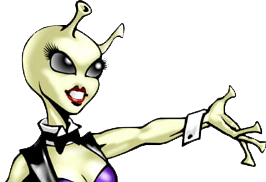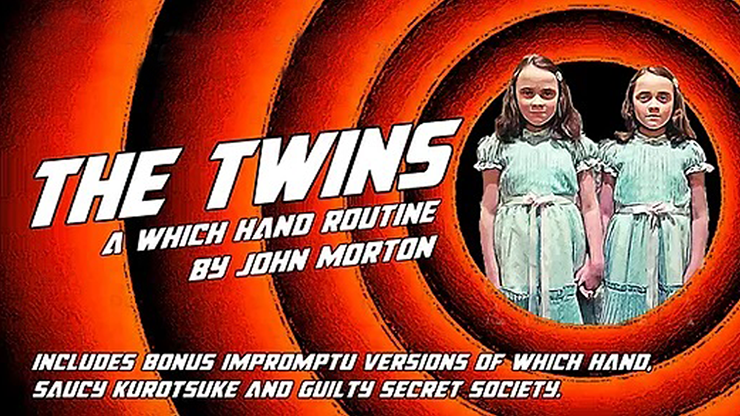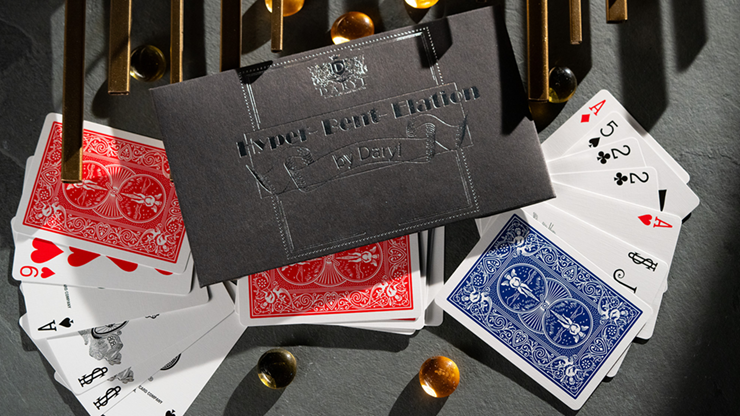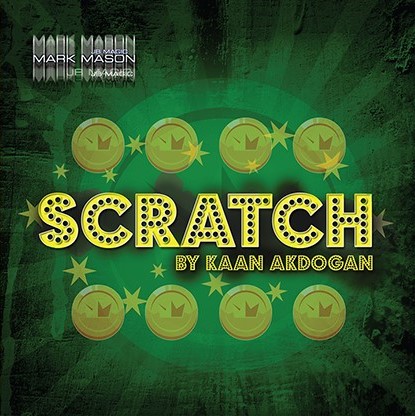Magic For The Eyes
Luke Dancy
(Based on 1 review)
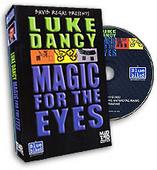
most visually arresting card effects ever seen,
using the simplest of secret gimmicks: double-stick tape.
Included in this collection are ten of Luke's pet card
routines that utilize this gimmick (and sometimes a few other
things) to produce astounding results. In addition, Luke has
included the killer routine "Warped", which is guaranteed to
make jaws drop. This is stunning card magic.
Effects:
* Split Personality
* Sandwich Way Did They Go?
* The Compressed Deck
* Stuck on Daley
* Chicago Closer
* A Productive Sandwich
* Aceselection
* Ambitious Production
* Four for Daley
* Advertise This!
Bonus:
* Warped
Reviews
(Top ▲)
Although it is not immediately apparent, Luke Dancy's Magic For The Eyes is in fact theme based, rather than personality based. That is to say, it's about the tricks -- all of which make use of one main principle -- not the man performing the tricks. Indeed, we rarely even see Luke's face, and only hear him speak during the explanations.
This is not a judgement call, and certainly not a complaint. Both the performances and explanations, while shot with a single camera pointing down at Luke's hands on a table, are abundantly clear, if not wildly dynamic.
More importantly, however, the magic on here is good -- at times very good -- and I have no doubt that even once you know the principle involved, you will still be fooled by Luke's unconventional applications.
Of the 11 tricks Luke presents, my personal favorites are "Split Personality," an eye-popper in which two Jokers transpose visually with a single chosen card; "A Productive Sandwich," wherein a chosen card appears between two Queens, then the Queens change into the three mates of the selection; "AceSelection," a very visual production of four Aces, followed by a quick sandwich effect; "Ambitious Production," an ultra clean Ambitious Card routine wherein, after a chosen card has risen to the top of the deck a few times, its three mates suddenly float up and appear beneath it; "Four For Daley," wherein two black tens change places with two red tens, then all four cards transform into the four Jacks; and finally, "The Compressed Deck," in which four cards with symbols and numbers from the entire deck scattered on their faces turn into a regular four-of-a-kind. This is extremely magical, and one of the better motivated packet tricks I've seen (specifically, there is some logic to introducing four cards as a "compressed deck," versus most packet tricks that purportedly use a handful of normal cards, yet for some reason they are brought out separately from the pack).
I am less enamored with "Stuck On Daley," a conceptually cluttered revelation of a chosen card (I see no justification here for introducing four-of-a-kind to find a selection as opposed to just producing it on its own); "Sandwich Way Did They Go," a similarly under-motivated transposition effect with two selections and two of the four Jacks ("Split Personality" is much stronger); and "Chicago Closer," a cross between the Chicago Opener and a color-changing deck routine that, while deceptive, strikes me as being busy, particularly at the end (there's just too much to follow -- I'd rather see these plots performed separately).
There are two other routines on here, both of which I'm sure you will like, including an interesting bonus effect called "Warped" that offers something new in the realm of visual card magic.
Magic For The Eyes is a good, solid collection of effective twists on existing plots. Card workers will find the DVD worth their while.
David Acer
This is not a judgement call, and certainly not a complaint. Both the performances and explanations, while shot with a single camera pointing down at Luke's hands on a table, are abundantly clear, if not wildly dynamic.
More importantly, however, the magic on here is good -- at times very good -- and I have no doubt that even once you know the principle involved, you will still be fooled by Luke's unconventional applications.
Of the 11 tricks Luke presents, my personal favorites are "Split Personality," an eye-popper in which two Jokers transpose visually with a single chosen card; "A Productive Sandwich," wherein a chosen card appears between two Queens, then the Queens change into the three mates of the selection; "AceSelection," a very visual production of four Aces, followed by a quick sandwich effect; "Ambitious Production," an ultra clean Ambitious Card routine wherein, after a chosen card has risen to the top of the deck a few times, its three mates suddenly float up and appear beneath it; "Four For Daley," wherein two black tens change places with two red tens, then all four cards transform into the four Jacks; and finally, "The Compressed Deck," in which four cards with symbols and numbers from the entire deck scattered on their faces turn into a regular four-of-a-kind. This is extremely magical, and one of the better motivated packet tricks I've seen (specifically, there is some logic to introducing four cards as a "compressed deck," versus most packet tricks that purportedly use a handful of normal cards, yet for some reason they are brought out separately from the pack).
I am less enamored with "Stuck On Daley," a conceptually cluttered revelation of a chosen card (I see no justification here for introducing four-of-a-kind to find a selection as opposed to just producing it on its own); "Sandwich Way Did They Go," a similarly under-motivated transposition effect with two selections and two of the four Jacks ("Split Personality" is much stronger); and "Chicago Closer," a cross between the Chicago Opener and a color-changing deck routine that, while deceptive, strikes me as being busy, particularly at the end (there's just too much to follow -- I'd rather see these plots performed separately).
There are two other routines on here, both of which I'm sure you will like, including an interesting bonus effect called "Warped" that offers something new in the realm of visual card magic.
Magic For The Eyes is a good, solid collection of effective twists on existing plots. Card workers will find the DVD worth their while.
David Acer
